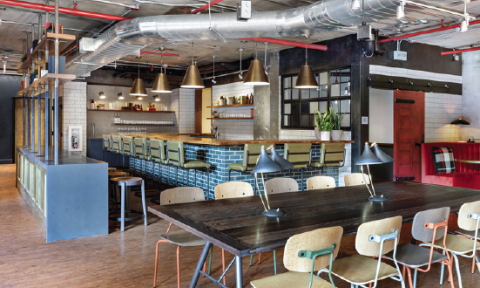Hotel News Now
March 19, 2019
REPORT FROM THE U.S.—Not just a growing trend among branded hotels, co-working spaces are seeing a rise in the independent hotel sector in response to traveler demand.
Some independent hotels have dedicated co-working spaces and services at a charge for non-guests, while others are more relaxed and informal in how they operate these spaces.
“I actually think independent hotels are a bit in front of the curve on this one,” Javier Egipciaco, SVP and managing director of Arlo Hotels, said in an email interview.
“I don’t know if you’ll see boutique brands labeling their spaces as ‘co-working areas,’ but you can already see how hospitality design in independent projects is shifting to bring people out of their rooms and into common areas.”
Marc Choplick, GM of BEI San Francisco, said the co-working trend is an advantage for independent hotels.
“Creating a multi-functional space expands the property’s capabilities, allowing it to cater to all types of travelers and the experience they’re interested in having,” he said in an email interview.
Revenue opportunity
The 177-room Revolution Hotel in Boston, which is operated by Provenance Hotels, has a dedicated co-working space that is a revenue generator. Leslie Lew, VP of revenue for Provenance, said the hotel is taking an entrepreneurial approach to how the co-working space is operated.
Lew said he looked at how national and regional co-working companies operate and found that most start memberships on the first of each month and run on a month-to-month basis, which he said isn’t conducive for travelers who live and work on the fly and need to set up shop temporarily.
The Revolution saw a demand for that and decided to create a reasonable daily membership for local business people. For guests of the hotel, the fee to use the co-working space is included in the room rate, he said.
The hotel made a conscious decision to serve people who are in town for a short period of time and give them the opportunity to “come in and be a member of our working space for a daily basis, a few days, or for the duration of your time in Boston,” he said.
“I believe that is one of the biggest differentiators we have, especially toward the known national co-working brands,” he added.
Lew said one of the reasons the hotel charges for the space is because he sees people pay to access these services elsewhere. Creating a reason to charge meant making sure the space adds value, he said.
He said this gives independent hoteliers who act like entrepreneurs and decide to turn unutilized spaces into a revenue-generating area “the ability to shine.”
Going the free-of-charge route
Some hotels are taking a different approach and not charging a membership fee, but that doesn’t mean there aren’t revenue opportunities, sources said.
Egipciaco said while Wi-Fi is free to use in the communal working spaces and no reservation is required at Arlo Hotels, guests who are working will spend money on food and beverage throughout the day.
“We don’t charge any fees because we want it to feel informal and friendly,” he said. “I know some of the bigger brands have been discussing adding a more formal ‘WeWork’ model into their hotels, but I’m curious how that will go over with business travelers.”
Choplick said the fourth-floor terrace space at BEI San Francisco, where guests can work and play, is free to use when it is not booked for events.
What the spaces need
At Arlo Hotels, the focus is on being inclusive rather than exclusive, which plays into how the spaces are designed and choosing activations that enlighten the guest, Egipciaco said.
For example, instead of dedicating space to private meeting rooms, all of the public spaces in Arlo SoHo and Arlo NoMad—which both have smaller room footprints—were designed to be flexible, he said.
“We have a variety of design schemes that cater to all types of nomadic workers. Conference tables with outlets are perfect for people who really need to plug in, but our lounge areas with comfortable couches and chairs are ideal for answering the quick email,” he said. “We also get a large amount of guests and locals who use our restaurants for business meetings.”
He said mobile charging stations was identified as a key need in areas where guests work. The hotel recently installed charging pads at the lobby’s bar tables to accommodate that.
“Our guests are constantly on the move,” he said. “They’re productive and in the know, and sometimes need to multitask while staying with us.”
The BEI San Francisco recently underwent a top-to-bottom, $30-million renovation that will debut this spring. The renovation included the addition of multiple co-working spaces that are open to the community, interactive and collaborative, Choplick said.
He said the hotel will introduce two new F&B concepts that capitalize on the co-working space on the ground floor. One will be a casual dining concept, and the other will be an on-the-go daytime dining option.
In addition to the ground floor co-working space, the hotel will have “Stay Work Play” rooms with a transformable living and office space that leads to the fourth-floor outdoor terrace, Choplick said. These room types will be accessible to groups for breakout meetings and sessions.
At The Revolution, programming is key for the co-working space, Lew said. The space has programs three days a week, including a mind, body and soul program that features yoga classes and food education, for example.
This, too, is a revenue opportunity for the hotel, he added, and helps bring awareness to the hotel.
Egipciaco also recognized that programming is becoming more important for co-working spaces.
“People in co-working spaces want to connect with like-minded individuals,” he said. “Both hotels and co-working companies are having to come up with more and more programming to keep clients engaged and dedicated to the brand.”

